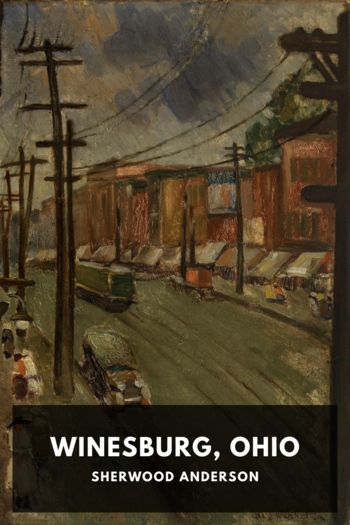Winesburg, Ohio Sherwood Anderson (free novels txt) 📖

- Author: Sherwood Anderson
Book online «Winesburg, Ohio Sherwood Anderson (free novels txt) 📖». Author Sherwood Anderson
To be sure, Enoch’s marriage did not turn out. He himself brought it to an end. He began to feel choked and walled in by the life in the apartment, and to feel toward his wife and even toward his children as he had felt concerning the friends who once came to visit him. He began to tell little lies about business engagements that would give him freedom to walk alone in the street at night and, the chance offering, he secretly re-rented the room facing Washington Square. Then Mrs. Al Robinson died on the farm near Winesburg, and he got eight thousand dollars from the bank that acted as trustee of her estate. That took Enoch out of the world of men altogether. He gave the money to his wife and told her he could not live in the apartment any more. She cried and was angry and threatened, but he only stared at her and went his own way. In reality the wife did not care much. She thought Enoch slightly insane and was a little afraid of him. When it was quite sure that he would never come back, she took the two children and went to a village in Connecticut where she had lived as a girl. In the end she married a man who bought and sold real estate and was contented enough.
And so Enoch Robinson stayed in the New York room among the people of his fancy, playing with them, talking to them, happy as a child is happy. They were an odd lot, Enoch’s people. They were made, I suppose, out of real people he had seen and who had for some obscure reason made an appeal to him. There was a woman with a sword in her hand, an old man with a long white beard who went about followed by a dog, a young girl whose stockings were always coming down and hanging over her shoe tops. There must have been two dozen of the shadow people, invented by the child-mind of Enoch Robinson, who lived in the room with him.
And Enoch was happy. Into the room he went and locked the door. With an absurd air of importance he talked aloud, giving instructions, making comments on life. He was happy and satisfied to go on making his living in the advertising place until something happened. Of course something did happen. That is why he went back to live in Winesburg and why we know about him. The thing that happened was a woman. It would be that way. He was too happy. Something had to come into his world. Something had to drive him out of the New York room to live out his life an obscure, jerky little figure, bobbing up and down on the streets of an Ohio town at evening when the sun was going down behind the roof of Wesley Moyer’s livery barn.
About the thing that happened. Enoch told George Willard about it one night. He wanted to talk to someone, and he chose the young newspaper reporter because the two happened to be thrown together at a time when the younger man was in a mood to understand.
Youthful sadness, young man’s sadness, the sadness of a growing boy in a village at the year’s end, opened the lips of the old man. The sadness was in the heart of George Willard and was without meaning, but it appealed to Enoch Robinson.
It rained on the evening when the two met and talked, a drizzly wet October rain. The fruition of the year had come and the night should have been fine with a moon in the sky and the crisp sharp promise of frost in the air, but it wasn’t that way. It rained and little puddles of water shone under the street lamps on Main Street. In the woods in the darkness beyond the Fair Ground water dripped from the black trees. Beneath the trees wet leaves were pasted against tree roots that protruded from the ground. In gardens back of houses in Winesburg dry shriveled potato vines lay sprawling on the ground. Men who had finished the evening meal and who had planned to go uptown to talk the evening away with other men at the back of some store changed their minds. George Willard tramped about in the rain and was glad that it rained. He felt that way. He was like Enoch Robinson on the evenings when the old man came down out of his room and wandered alone in the streets. He was like that only that George Willard had become a tall young man and did not think it manly to weep and carry on. For a month his mother





Comments (0)